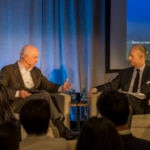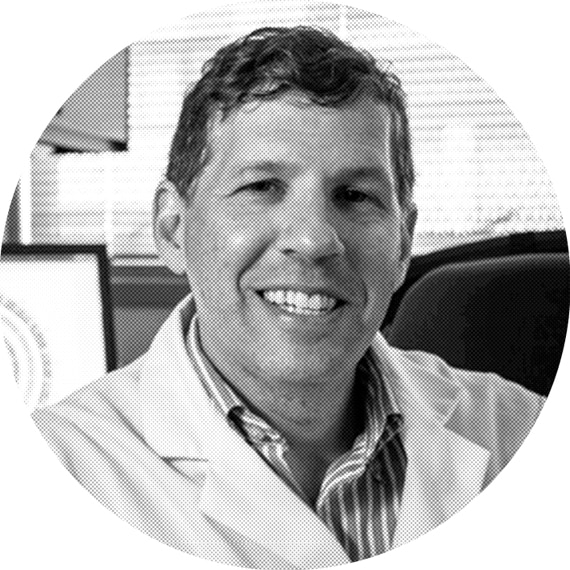Francisco González: "The transformation of the banking sector will drive economic growth and reduce inequality"
Francisco González, Group Executive Chairman of BBVA, presented the book The Next Step: Exponential Life in an event held at the Massachusetts Institute of Technology, This work collects the insights of twenty of the world’s most authoritative voices in a number of fields, analyzing the tremendous opportunities – and the risks and uncertainties – that the so-called “exponential technologies” will bring to humanity

The Next Step: Exponential Life, is the ninth book in BBVA’s annual series, published within the framework of the OpenMind project, a digital knowledge community that provides free access not only to the content of the books, but also to articles, interviews, videos and infographics, dedicated to an increasingly broader readership. The Next Step is available for download in Spanish and English in different electronic formats.
During the book’s presentation event at the MIT, BBVA’s Group Executive Chairman noted that about 250 authors are already participating in this collaboration platform, which BBVA rolled out to generate and disseminate knowledge with potential to benefit society and “bring the age of opportunities to everyone.”
Developments in bioscience, robotics, artificial intelligence or the Internet of Things “are already changing the way we live, work and interact, but also what seem to be elemental constants of human nature: it now seems possible to radically enhance human physical and intellectual capacity, and to extend life expectancy to such an extent that it even changes our concept of mortality,” said Francisco González.

Francisco González, Group Executive Chairman of BBVA, presented the book The Next Step - BBVA
Many of these “exponential technologies” are already being rolled out within the banking industry, driving a transformation process that is going to “generate enormous benefits for the users, in terms of the quality, convenience and price of products and services. It will allow many millions of lower-income people throughout the world to access financial services, improving their standards of living and their opportunities,” said BBVA’s Chairman. In macroeconomic terms, “this means a powerful structural reform that will encourage growth and reduce poverty and marginality.”
“We are undoubtedly headed toward a new and better financial industry; - concluded Francisco González – however, we don’t know its final shape yet – or even if banks will occupy a place in it.”
Joining BBVA’s Group Executive Chairman during the presentation were Joseph Paradiso, Head of the Responsive Environments Group in MIT’s Media Lab; Jonathan Rossiter, professor of Robotics at the University of Bristol; Stephen M. Lipkin, Weill Cornell Medical College Adult and Cancer Genetics Clinic; and Séan Ó hÉigeartaigh, Executive Director of Cambridge's Centre for the Study of Existential Risk.
Joseph Paradiso, Head of the Responsive Environments Group in MIT’s Media Lab

Joseph Paradiso explained how the Internet of Things and the world wide web of interconnected sensors will end up becoming a “seamless electronic nervous system, spanning the whole planet.” The Director of the Responsive Environments Group detailed some of the experiments that are being tackled in his laboratory, including, for example, electronic clothes. In his opinion, these smart garments will have a tremendous impact far beyond fashion or sports. They will also revolutionize other fields, such as medicine.
In the future, it will be possible to weave artificial muscles into fabric, a development that will help restore mobility in disabled people. Paradiso also spoke about the smart skins, i.e. a second robotic skin capable of interacting with human tissue – that could be used to make smart bandages to promote healing. Combining this technology with robotics, "we could be able to build implantable medical devices that can restore the functionality of diseased and damaged organs and structures” Such bio-integrating soft robotics “is under development and expected to appear in the clinic over the next ten to fifteen years,” said Paradiso.
Jonathan Rossiter, professor of Robotics at the University of Bristol

Soft robots are precisely Jonathan Rossiter's area of specialization. Rossiter agreed with Paradiso in that, in the future, “nothing in society or in our lives will escape the influence of robotics. From robots that can monitor and repair the natural environment to nano robots to track and kill cancer, and from robots that will lead the way to planetary colonization to robot companions to keep us from loneliness in old age.” And these robots will be biodegradable and environmental-friendly: they will live, die and disappear without damaging the environment.
Stephen M. Lipkin, Weill Cornell Medical College Adult and Cancer Genetics Clinic

Genomic sequencing is another one of the topics on which the book focuses.. In the presentation held at the MIT, Stephen M. Lipkin analyzed the legal and ethical implications of this technology. Screening the seventy-six genes held by expert medical consensus to influence clinical management “will identify about one in twenty who carry a mutation in a gene that will influence their medical care,” said this specialist in autoimmune diseases.
“Genomic studies will allow detecting diseases in patients before symptoms arise or New medical tests and drugs will be developed to diagnose and treat previously undiagnosed genetic conditions and, probably, improved knowledge of the genetics will also reduce health-care costs,” he said. But this will require the development of laws capable of protecting citizens against genetic discrimination, which is, in Lipkin opinion, “in fact already happening around the world.”
Séan Ó hÉigeartaigh, Executive Director of Cambridge's Centre for the Study of Existential Risk

The risks entailed by genomic sequencing and genetic engineering are two of the threats about which Séan Ó hÉigeartaigh is concerned. “Humanity has always faced threats to its global survival, such as asteroid impacts and supervolcanoes” – warns the Executive Director of Cambridge's Centre for the Study of Existential Risk. “Yet now the greatest risks we face may be a result of our own scientific and civilizational progress. We are developing technologies of unprecedented power, such as nuclear weapons and engineered organisms. We are also wiping out species, changing the climate, and burning through the earth’s resources at an unsustainable rate as the global population soars.” However, Ó hÉigeartaigh believes that “the coming century’s breakthroughs in science and technology will also provide powerful solutions to many of the greatest challenges we face.”